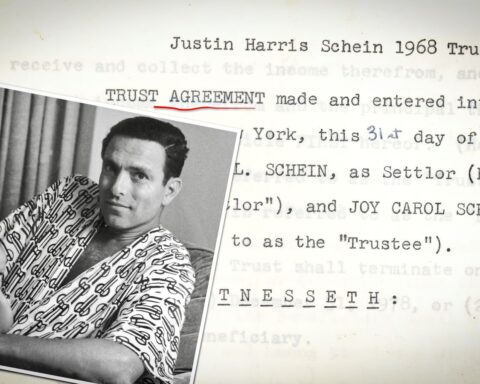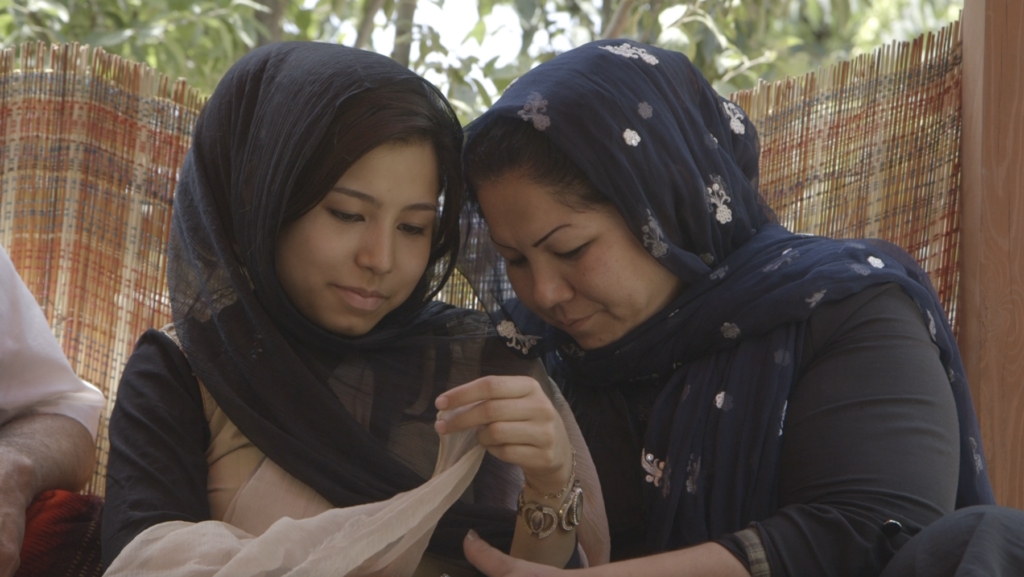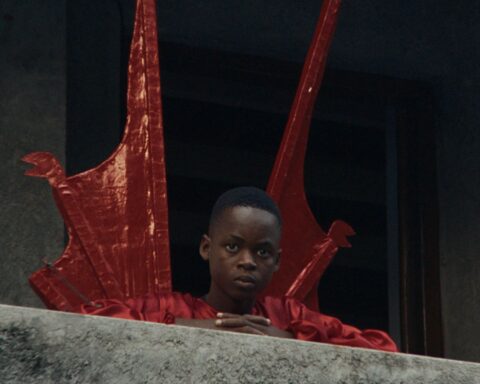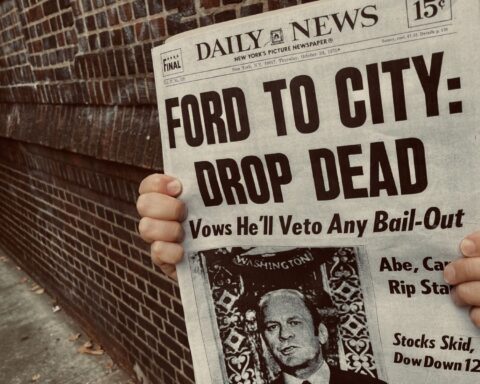One of the highlights of Hot Docs 2018 was the International Premiere of director-producer’s Liz Garbus’s The Fourth Estate. Co-directed and produced by Jenny Carchman (Enlighten Us, Koch), The Fourth Estate is an ambitious exploration of The New York Times as the publication’s staff grapples with Donald Trump hulking into the presidency of the U.S.A.
The four part series debuts on Showtime at the end of May. Hot Docs screened the first episode, which zeroes in on Trump’s first 100 days. The first episode revisits familiar events like Michael Flynn’s resignation as National Security Advisor, Trump’s first speech to Congress, and the failure to repeal the Affordable Care Act through the eyes of Times reporters trying to navigate the frenzy of Trump Land, not to mention the side effects of their own personal turmoil.
A filmmaker since high school and a onetime intern at Miramax, New York-raised Garbus has covered a wide range of subjects in her docs, often focusing on high-pressure situations. The Farm: Angola (1998) takes you in close to prisoners in one of the most hopeless penitentiaries in America while Girlhood (2003) shows violated young women in a detention centre. Garbus’s father, she points out during a Hot Docs interview, is a civil rights lawyer, whose world view must have influenced some of her subject choices.
The movingly poetic Love, Marilyn (2012) offers a meditation on Marilyn Monroe in which A-List actors like Glenn Close, Paul Giamatti, Uma Thurman and Viola Davis read from prose and poetry about MM as well as her own intimate writings. Garbus’s best-known film, her Oscar-nominated What Happened, Miss Simone? (2015) both celebrates and elegizes one of the most unique and passionate black female performers in the history of jazz. Like the characters in The Farm and Girlhood, Marilyn Monroe and Nina Simone sought freedom but were also locked up, in the case of these brilliant women, by their own psyches. You could say the same of Garbus’s protagonist in Bobby Fischer Against the World (2011), a doc about the troubled chess master’s confrontation with Russian star Boris Spassky in 1972.
Other Garbus highlights as director and/or producer are Nothing Left Unsaid: Gloria Vanderbilt & Anderson Cooper (2016); The Nazi Officer’s Wife (2003), about the relationship between a fugitive Austrian Jewish woman and the Nazi who loves her, knowing her true identity; Ghosts of Abu Ghraib (2007), and Shouting Fire: Stories from the Edge of Free Speech (2009). Her upcoming project is an HBO series adaptation of the late Michelle McNamara’s investigative book, I’ll Be Gone in the Dark: One Woman’s Obsessive Search for the Golden State Killer. The book recounts the author’s pinpointing of James DeAngelo as the serial killer and rapist who terrorized California for a decade.
Episode One of The Fourth Estate opens on Donald Trump’s inauguration. At the heart of the story is the sad truth that like other news media, The New York Times has never been in the position of trying to cover a presidency so deceptive and chaotic. In an early scene, executive editor Dean Baquet’s is both incredulous and excited. A crazy-but-true story has just dropped. Baquet, the newspaper’s first black executive editor, says of Trump’s modus operandi, ”Everybody’s an asshole.” So “how do you govern?”
What Happened, Miss Simone? is a passionate movie, telling a tragic story about a soulful performing artist with a film approach that feels very different from The Fourth Estate’s. The approach and the subject matter of The Fourth Estate are far more cool and detached than the Oscar-nominated Simone bio-doc with all its music and its powerful main character. What did Garbus learn from her previous work and why, in my estimation, does it seem like a departure for her?
Liz Garbus replies, “I think as time goes on, we go deeper with the subjects. And the ideas marinate a bit further and deeper. Perhaps [in time] it will feel more akin to other stuff I made that you have seen.”
Speaking further about The Fourth Estate, she says that it “is a dramatic, potentially tragic story as well. My first feature doc, The Farm, about the Louisiana State penitentiary, was more traditional verité reportage. As was a film I made called Girlhood. It is an area I’ve travelled in before. The Nina film was an incredibly special project, but shooting vérité in heated environments is something that I’ve done before, and I really love doing.”
As for the movie’s focus on reporting news during an era of unprecedented attacks on the media, “I also made a film called Shouting Fire: Stories from the Edge of Free Speech, which is about free speech challenges. My father is a First Amendment lawyer. The Fourth Estate feels more close to home in fact.”
Every day, The Trump Reality Show yields excoriating twists and turns. The story will obviously keep pushing forward, Do Garbus and her crew plan to jump back into it?
“This film is not about breaking news,” Garbus says. “It’s not about the Trump presidency. It’s about journalists adjusting to the seismic tidal wave in the political landscape, and figuring out how to cover it—how do they make sense of it? How do they gain transparency and sunlight into stories that are shrouded in secrecy? In that sense, the story is about that year of adjustment.”
The unfolding story could head toward something incredibly tragic. King Lear meets Macbeth. Garbus doesn’t completely rule out the possibility of jumping back in, but after a year of shooting The Fourth Estate, which wrapped recently, she’s obviously not seriously entertaining a return to the project.
Watching The Fourth Estate, you get the impression of Times staffers like Dean Baquet and Maggie Haberman tumbling into a rabbit hole and struggling to stay upright. In a key scene, Haberman who’s been covering Trump for years takes a call from him in the aftermath of his losing the Affordable Care Act vote. She asks if he’s glad it’s over with, and as if this is a chat between buddies, he answers, “Yeah, it’s enough already.” Haberman is the same journalist Trump claims he never speaks to and has called “third rate.”
The situation is preposterous, but the Times people diligently vet every story and rely on “teamwork which is important,” says Garbus. It “puts eyes on the story, and helps get it ready.” We see the reporters changing headlines and leads, meeting online deadlines, and setting up phone alerts. But as they discuss stories about outright lies like Trump’s claim that Obama was bugging him, they are obviously struggling to uphold New York Times standards while wading through an unchartered swamp. In a revealing moment, one of the staffers mutters, “It’s a farce!” When you know that you’re dealing with total absurdity, but you go ahead and take action anyway, you’re like one of Albert Camus’s existential heroes, performing a Sisyphean task.
“Everybody knew the wiretapping claim was untrue,” says Garbus. “But you have to cover it, because the president is saying it. It’s a huge challenge for news organizations to figure out how to cover this. The whole industry is reeling and trying to figure out how to deal with these busted norms.”
Garbus refers to Michelle Wolf, who had just delivered her scathing takedown of Trump Land and the media at the 2018 White House Correspondents’ Dinner. Garbus doesn’t elaborate, but she’s probably thinking that for someone like Wolf, covering Trump seriously, as if he were meeting the usual norms, legitimizes him and continues a mutually profitable symbiotic relationship with the media, ongoing since he bullshitted his way through the Manhattan social and business scenes.
Alternative media, like the late night comedians, would mock and satirize Trump, not taking him seriously.
“As Dean says,” Garbus responds, “There are a lot of outlets out there for Snark, for the easy hit. The Times has a role which is to head down the middle and tell it as it is without a lot of snarkiness, and that hopefully provides a public service because it invites more people in.”
As The Fourth Estate moves forward, it deepens its look at the Times coverage of the Russia investigation. Moreover, “In episode two, we talk about the changing model of the business,” Garbus explains. Jenny Carchman, also at the interview along with producer Justin Wilkes, adds, “It’s a new thing for them too. Normally, you would file a story, something that happened on Monday, for tomorrow’s paper. Now you file it within an hour.” “The news cycle doesn’t stop,” says Wilkes.
“We call episode two The Trump Bump,” Carchman continues. “It’s about the media getting an enormous amount of subscribers because of Trump, because of this story, and also having to face how they are going to survive as an institution. What’s the model of news? How to they persevere?”
As for the doc’s shooting approach, Carchman says, “This was pure vérité. The crew consisted of cameraman, soundman, Liz or myself. Everything is natural light. Everything is on the fly. Everything is incredibly intimate.
“The Washington DC office is very small, really tight. So to be there was a challenge because we were in everybody’s face.” On the other hand, “New York is big, big, big. Multi-floors with big open areas. So you could walk around and talk to people while the rest of the office is working fine.
“And they are under such pressure to tell the story, whether it’s policy, or palace intrigue. They’re not sure whether they totally have a hold on it. And us standing over them while they’re trying to figure things out was a challenge for them. Some people were okay. Some people could kinda forget about us. Others couldn’t. We did the best we could.”
Episode three of The Fourth Estate deals with the widening split between red and blue states while the fourth part emphasizes coverage of the #MeToo story while deepening the Russia story.
Judging from episode one of The Fourth Estate, the series handles its complexities with elegance and verve. Overall, it’s asking an important question about media coverage of a potentially dangerous media manipulator. As Wilkes puts it, “How do you report on this presidency in a way that is factual and accurate, bit without continuing to feed into the machine?” How do you continue to publish “the news that’s fit to print?”
The Fourth Estate premieres on Crave TV on May 27.
Hot Docs runs April 26 to May 6. Please visit hotdocs.ca for more info.











